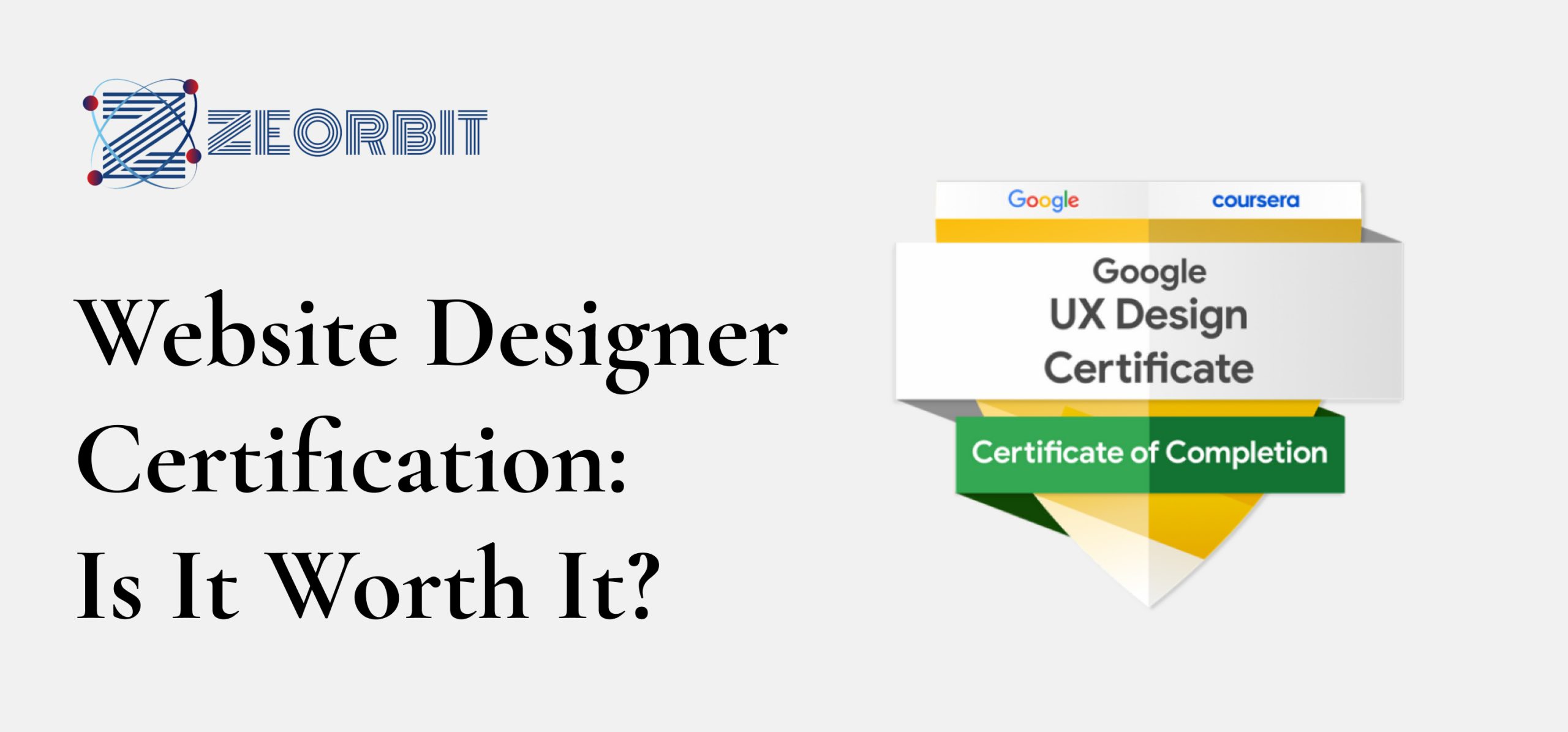Website Designer Certification: Is It Worth It?
Website Designer Certification: Is It Worth It?
The digital world is constantly evolving, and with it, the demand for skilled website designers continues to grow. But with so many online courses and bootcamps available, a common question arises: is getting a website designer certification really worth the time and investment? This article will delve into the pros and cons of website designer certifications, explore different types of certifications, and ultimately help you decide if pursuing one is the right path for your career goals.
What is Website Designer Certification?
A website designer certification is a credential that validates your skills and knowledge in the field of website design. These certifications are typically offered by reputable organizations, educational institutions, or software companies and require passing an exam or completing a project-based assessment to demonstrate your competence. The curriculum often covers areas like:
- UX/UI Design Principles: Understanding user experience (UX) and user interface (UI) design principles to create intuitive and user-friendly websites.
- Visual Design: Proficiency in visual design elements such as typography, color theory, and layout.
- Web Design Software: Expertise in industry-standard software like Adobe Photoshop, Adobe Illustrator, Figma, and Sketch.
- HTML, CSS, and JavaScript (Basic): A foundational understanding of these coding languages to implement design concepts.
- Responsive Design: Creating websites that adapt seamlessly to different screen sizes and devices.
- Accessibility: Designing websites that are accessible to users with disabilities, adhering to WCAG guidelines.
- SEO Basics: Understanding search engine optimization (SEO) principles to improve website visibility.
Benefits of Website Designer Certification
Obtaining a website designer certification can offer several advantages:
- Enhanced Credibility: A certification can significantly enhance your credibility and showcase your expertise to potential clients and employers.
- Improved Job Prospects: Many employers prefer candidates with certifications, as it demonstrates a commitment to professional development and validated skills.
- Higher Earning Potential: Certified website designers often command higher salaries than those without certifications, especially those who can show successful projects in their portfolio.
- Structured Learning: Certification programs provide a structured learning path, ensuring you cover all the essential aspects of website design.
- Industry Recognition: Certain certifications are recognized and respected within the industry, adding value to your resume.
- Staying Up-to-Date: Many certifications require periodic renewal, which encourages you to stay updated with the latest trends and technologies in web design.
Drawbacks of Website Designer Certification
While certifications can be beneficial, it’s important to consider potential drawbacks:
- Cost: Certification programs can be expensive, especially those offered by reputable institutions.
- Time Commitment: Completing a certification program requires a significant time commitment, which may be challenging for individuals with busy schedules.
- Not a Guarantee of Success: A certification alone does not guarantee success in the field. Practical experience and a strong portfolio are equally important.
- Relevance: The value of a certification can vary depending on the specific certification and the needs of the employer or client. Some certifications may focus on specific software or technologies that are not universally used.
- Potential for Outdated Information: In the rapidly evolving world of web design, some certification programs may not be entirely up-to-date with the latest trends and technologies.
Types of Website Designer Certifications
Several types of website designer certifications are available, catering to different skill levels and specializations. Here are some popular options:
- Adobe Certified Professional (ACP) in Visual Design: This certification validates your expertise in Adobe Creative Cloud applications like Photoshop, Illustrator, and InDesign, focusing on visual design principles.
- Certified User Experience Analyst (CXA): This certification focuses on user experience (UX) design principles and methodologies, covering areas like user research, usability testing, and information architecture.
- Human Factors International (HFI) Certifications: HFI offers various certifications in UX design, including Certified Usability Analyst (CUA) and Certified User Experience Professional (CXUP), catering to different levels of experience.
- Google UX Design Professional Certificate: Offered through Coursera, this certificate program provides a comprehensive introduction to UX design, covering the entire design process from research to prototyping and testing.
- Webflow Certification: This certification validates your proficiency in using the Webflow no-code web design platform.
- General Assembly UX Design Immersive: While not a certification, completing an immersive boot camp like this can provide industry-recognized training and enhance career prospects.
- HubSpot Academy Certifications: HubSpot offers various free certifications related to web design, content marketing, and inbound marketing, which can be valuable for website designers who work with these technologies.
Factors to Consider Before Pursuing Certification
Before investing time and money in a website designer certification, consider the following factors:
- Your Career Goals: What are your career aspirations? Are you looking to work for a large corporation, a small agency, or as a freelancer? Research what certifications are valued in your desired industry and role.
- Your Current Skill Level: Assess your current skills and knowledge in website design. Choose a certification program that aligns with your skill level and focuses on areas where you want to improve.
- The Reputation of the Certification Provider: Research the reputation of the organization offering the certification. Look for established institutions or industry leaders with a track record of providing high-quality training.
- The Curriculum and Content: Review the curriculum and content of the certification program to ensure it covers relevant topics and uses up-to-date technologies.
- The Cost and Time Commitment: Consider the cost of the certification program and the time commitment required to complete it. Make sure it fits within your budget and schedule.
- The Value to Potential Employers or Clients: Research whether the certification is recognized and valued by potential employers or clients in your target market.
Building a Strong Portfolio
Regardless of whether you pursue a certification, building a strong portfolio is essential for showcasing your skills and landing jobs in website design. Your portfolio should include:
- A Variety of Projects: Showcase a diverse range of projects that demonstrate your skills in different areas of website design, such as UX/UI design, visual design, and responsive design.
- Real-World Projects: Include projects you’ve worked on for real clients or organizations, if possible. This demonstrates your ability to apply your skills in a professional setting.
- Personal Projects: If you don’t have real-world projects, create personal projects that showcase your creativity and technical skills.
- Case Studies: Write case studies that explain your design process, the challenges you faced, and the solutions you implemented for each project.
- A Clear and Concise Presentation: Present your portfolio in a visually appealing and easy-to-navigate format.
Conclusion: Is Website Designer Certification Worth It?
Ultimately, the decision of whether or not to pursue a website designer certification is a personal one. There’s no one-size-fits-all answer, and the value of a certification depends on your individual circumstances, career goals, and the specific certification you choose.
If you are new to the field of website design, a certification can provide a structured learning path, validate your skills, and enhance your credibility. However, if you already have significant experience and a strong portfolio, a certification may not be necessary.
Regardless of whether you pursue a certification, continuous learning and skill development are crucial for success in the ever-evolving field of website design. Stay updated with the latest trends, technologies, and best practices, and always strive to improve your skills and create exceptional user experiences.
Remember to network! ☏ 619-724-9517 | ✉️ info@zeorbit.com. And don’t forget to highlight your unique skills with bigger fonts to stand out!


